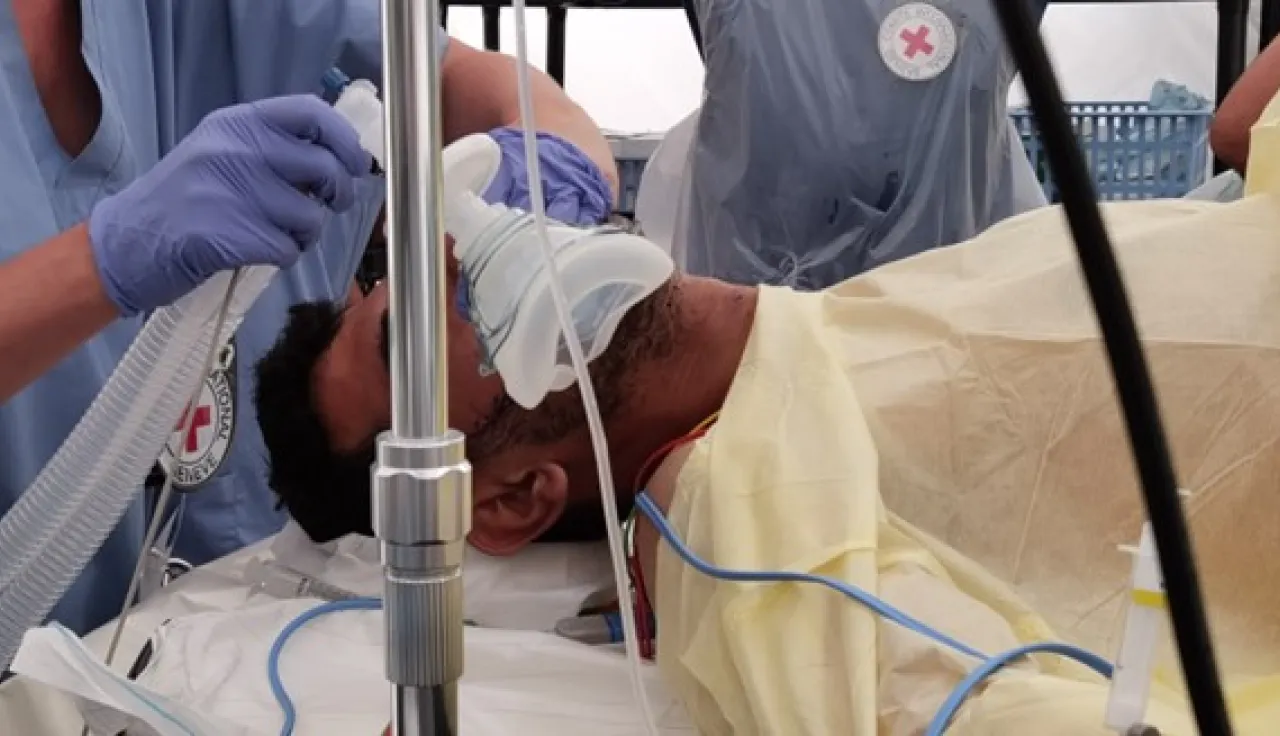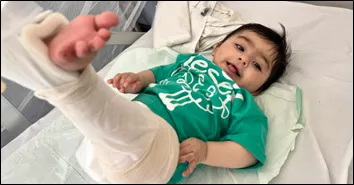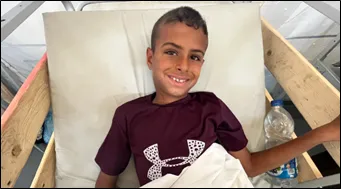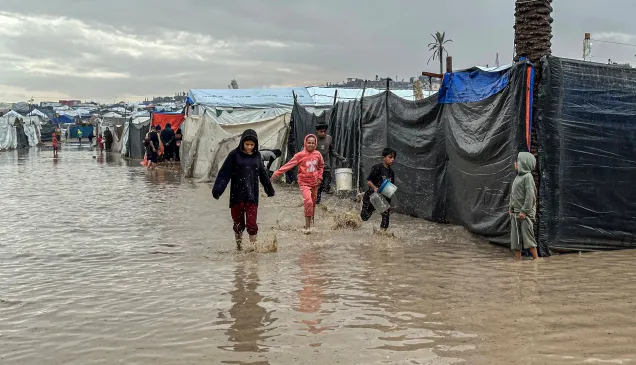Red Cross Field Hospital in Rafah, Gaza Strip: Facts & Figures 9 May 2024 – 12 April 2025

The Red Cross Field Hospital was established and opened on 9 May 2024, and is implemented in coordination with the Palestine Red Crescent Society and supported by Red Cross Societies of Australia, Austria, Canada, China (Hong Kong branch), Denmark, Finland, France, Germany, Iceland, Japan, Norway, Sweden, Switzerland, and the United Kingdom.
It is located in Rafah area of the Gaza Strip, and it's sole purpose is to provide medical services to civilians affected by the current armed conflict.
One Year On…
In May 2024, the International Committee of the Red Cross (ICRC), 14 Red Cross Societies, and the Palestine Red Crescent Society (PRCS) collaborated to establish the Red Cross Field Hospital (RFH/Field Hospital) to address the overwhelming medical needs as a result of the ongoing armed conflict. What started as a temporary medical support response activity turned into a year-long effort. Throughout the year, the teams worked tirelessly saving many patients; sadly, many others have been lost.
“None of us expected the human suffering – and therefore the need of a field hospital – to be this immense or to last this long; but as long as there are victims of war, we remain fully committed to continue caring for the sick and wounded.” – Julien Chassany, ICRC head of programmes for Israel and the Occupied Territories
The Red Cross Field Hospital was directly impacted by military operations carried out across the Gaza Strip, from active operations in Rafah in April 2024 during the construction phase of the hospital, recurrent escalations throughout the year, and, ultimately, the resumption of hostilities on 18 March 2025.
A Resumption Of Hostilities
The resumption of hostilities has reportedly led to over a thousand people killed across the Gaza Strip[1]. Multiple successive evacuation orders generated fear and confusion around the facilities. Evacuation zones are now in close proximity to the southern wall of the Field Hospital, effectively making it a frontline hospital, and one of the few remaining fully functioning field hospitals in Rafah. However, since hostilities resumed, no injured people from the south have been able to reach the Field Hospital because civilian movements within evacuation zones are extremely dangerous. All the patients in recent weeks have come from points of origin north of the Field Hospital.
Tragedy In The Red Cross/Red Crescent Family
On the night of 23 March 2025, eight medics from the Palestine Red Crescent Society (PRCS) were killed while trying to reach injured people that had called for an ambulance. Another medic whose whereabouts were unknown for several days was later confirmed to have been detained. International humanitarian law is clear: it affords special protection to medical facilities and personnel, who must be respected and protected in all circumstances. All parties must ensure that hospitals and medical facilities can remain sanctuaries to preserve human life.
‘Some of these medics have regularly volunteered at the Red Cross Field Hospital throughout the year. We worked together, laughed together, saved lives together, and mourned together for the ones we couldn’t save. So, when we say, “their loss is ours”, we mean it in every sense of the word.’ – Sally Khald Abu Borhum, psychologist at the Red Cross Field Hospital
Main statistics (since 9 May 2024)
Consultations

Field Hospital’s working days are Sunday to Thursday, but the Emergency Department remains open 24/7 and on weekends and serves as an ad hoc Outpatient department. Throughout the past year, the 60 beds of the Field Hospital have seen 2,000 patients admitted/discharged. A full breakdown of age range and gender can be found in the patient demographics section.
Surgical procedures

Immediately after the resumption of hostilities on 18 March, the RFH saw a 50% increase in the number of surgical procedures while the number of admitted patients dropped by approximately 10%. The week of 13-19 April saw the highest number of Outpatient & Emergency Department consultations since the establishment of the Field Hospital, with 2,396 patients visiting or brought to the hospital. Since the opening of the Field Hospital, these surgical procedures include general surgical interventions (54%), removal of dead or infected skin or tissue (33%), orthopaedic (8%), and others (5%).
Deliveries

Over 13% of births have had to be done via caesarean section (54 c-sections; 354 standard vaginal deliveries).
Physiotherapy
Phase one of the ceasefire (19 January – 2 March) and the period before the full resumption of hostilities (18 March) afforded some people in Gaza a period of respite – allowing time to start processing their experiences since October 2023. The period of relative calm also allowed the Field Hospital to establish an Amputation Stump Revision programme in collaboration with other health-care providers[1]. This programme is part of the medium- to long-term healthcare that is needed for victims of war; health care responses always outlast the period of active conflict. This is especially relevant for children whose bones continue to grow until their bodies are fully developed. The resumption of hostilities meant that medium-to-long-term planning of medical responses are put on hold, as hospitals and health-care facilities are forced to revert to emergency response.
Mental Health and Psycho-Social Support Sessions
Since May 2024, patients have received individual sessions to help them to cope with the stress of the conflict. Group sessions have been provided to patients and/or caretakers to address specific mental health and psychosocial support (MHPSS) needs. Moreover, family sessions have been provided to some patients and their caretakers to help caretakers manage their stress and guide them on how to better support the patients.
A survey conducted between 11-13 March 2025 revealed that 88% of respondents have lost homes or family members and that 70% want emotional support but only 50% have access to psychological support. When asked about their emotional state in the two weeks prior to the survey: 66% suffer from persistent worry; 62% have distressing war-related memories; 58% notice a loss of interest in daily activities; 34% feel hopeless; 28% feel worthless; and 24% have had suicidal thoughts. Of those that have children, 50% of the parents notice psychological symptoms in their children after October 2023.
Deliveries of anesthesia
(36,605 general anaesthesia, 12,906 regional anaesthesia, and 9,311 local anaesthesia). These are done for a variety of medical interventions in the Field Hospital, including sedation for short procedures, pain relief for change of dressings, and general anaesthesia for surgeries that require intubation.
Patient demographics
Of the 80,241 patients seen in the outpatient department and the emergency department:
-
54% are male; 46% are female
-
37% are children under 18 years of age:
-
12% are under 5 years of age.
-
17% are in the 5-14 years age range.
-
8% are in the 15-17 years age range.

A patient (Juwan) | Credit: Ghaydaa Abu Samaan, ICRC
These numbers are consistent with other health-care facilities and field hospitals, such as the UK-Med field hospital, also located in Rafah, who reported that approximately 40% of their patients are under 18 years of age.
Resources, Challenges And Concerns
The Field Hospital was not designed to go through multiple seasonal changes. Seasonal changes generate additional wear-and-tear of the fabric of the Field Hospital. Nevertheless, the workshop and technical team continue to patch breaks and leakages as they appear, ensuring the continuity of the hospital.
The reverse osmosis water purification systems have been the silent lifeline of the Field Hospital. Since it opened, the Field Hospital has produced over 2,200 tonnes of drinking water to meet the needs of the patients, their caretakers, and the staff at the hospital. When the needs are dire and resources unavailable at the other premises of the Red Cross teams in Rafah, drinking water is also transported there.
Scabies continue to present a serious issue amongst patients[2], accounting for over 30% of the outpatient cases in the past few weeks. More frequent deep cleanings are scheduled to mitigate the risks of infections.
As summer approaches, an increase in houseflies has been observed. Mosquito nets have been installed to prevent infections, prioritizing admitted patients that have to keep their wounds open post-operation.
On 24 March 2024, an ICRC premises 150 metres away from the Field Hospital was struck during the ongoing armed conflict. Later, on 16 April, yet another ICRC office was struck.
As a result, the Field Hospital delegates’ residence compound was rearranged to include a makeshift warehouse. The ICRC Logistics Base – located approximately 600 metres south of the Field Hospital – has been vacated now that it falls within the evacuation zone issued by the Israeli Defence Force (IDF) – making access difficult for rapid dispatching of stored items and equipment. Temporary solutions have been found to store items without impacting the operations of the Field Hospital.





